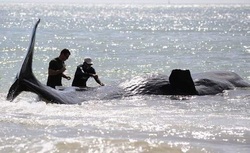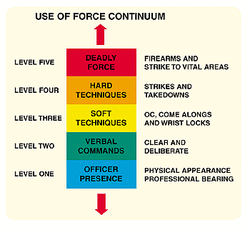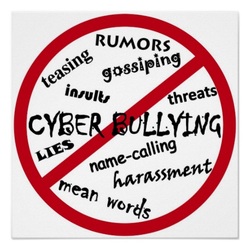 Beached whale, already near death, is euthanized with 6-foot needle is written by Christie D'Zurilla from the Los Angeles Times. In this article, D'Zurilla is reporting about a sperm whale that was beached on Thursday in Tampa, Florida. The onlookers said that there was in fact something wrong with the whale. The report states that the 30-foot sperm whale was about 20 feet offshore and already near death. Many different organizations showed up to the scene with many concerns on what to do with the whale. A strong sedative was given to the whale just before a 6-foot needle was plunged into his chest cavity with a drug to stop his heart. Many of the onlookers said that the needle was "large and scary" but the procedure was in fact very humane and had been used before in situations like this. In my opinion, someone or something being euthanized can be a good thing. This sperm whale was suffering from something that caused him a lot of pain and killing him was in fact the only thing that could help him. The whales fate was left in the arms of people that really cared about him. Euthanasia is illegal in most countries but in a country where it is legal family members chose to euthanize that certain person who is suffering from a incurable, painful disease. In the article, Euthanasia: Prolonging life is cruel talks about how euthanasia should be legal in countries because it in fact helps the patient suffering. Tim Brown is the writer of this article and he says euthanasia is a good thing because it is allowing someone who is suffering to die with dignity.
 Police Brutality: The Use of Excessive Force is written by David Managan. In this article, Managan is explaining that in certain situations, police officers do use force. Managan explains that police officers do have strict guidelines to follow when using force and that it should be used in a minimum amount needed to achieve the purpose. The article contains the stages in which force can progress 1. verbal persuasion, 2. unarmed physical force, 3. force using non-lethal weapons, 4. force using impact weapons and 5. deadly force. Anything after step 5 is considered police brutality. In my opinion, police officers should use "force" but only in certain situations in which their life is in danger. A few situations in which force should be used to achieve the purpose is a domestic violence interaction gone wrong, fleeing felons, a kidnapping investigation, etc. Force is one of the most important factors shaping the police role. The use of force is what differentiates police from other professionals. When police officers deal with dangerous situations, they have a little time to determine the proper response. Police officers should not use force just because they get ticked off by a civilians actions but use proper force to achieve the problem. The news article, Police officers claiming assault acted "unlawfully and used excessive force" is written by Alyshah Hasham. In this article, Hasham is reporting an incident in which two police officers used excessive force in a situation that could of been ignored. The dispute happened over a parking spot in New York City.
 Cyberbullying Investigated in death of Florida Girl is written by Barbara Liston. In this article, Liston is reporting the death of 12- year- old girl Rebecca Ann Sedwick. The cause of death was suicide and the reason this young girl took her own life was because she was a victim of cyber bullying. In the investigation of Sedwicks death, more than a dozen girls were under investigation for bullying her but the number of suspects have been narrowed down. The investigators found messages addressed to Sedwick stating things like "you should die" and "why don't you go kill yourself." Before her death, Sedwick was hospitalized for mental health treatment and was home schooled. During the investigation, investigators came across a cryptic message Sedwick sent to a boy in North Carolina telling him about the decision to kill herself, the message said "I'm jumping. I can't take it anymore." Cyber bullying results in lack of confidence/self-esteem, stress, health problems and even suicide thoughts. Now I really don't think this is an article where I agree or disagree but I can certainly write my opinion. I think cyber bulling is one of the worst things one human being can do to another. Cyber bullying can cause so much pain in just one individual. Rebecca Ann Sedwick was only 12 years old when she made the decision to end her life and situations like this hit home for some people. The one thing I believe in is that anybody under the age of 14 shouldn't be involved in social media. Some kids at this age are rude and will do or say anything to break down the walls of an individual. An article I found is basically a followup article to the one about the investigation of Rebecca Ann Sedwick. Lessons Learned from latest cyberbullying tragedy is written by Nanci Hellmich. In this article, Hellmich is talking about the ways the world can prevent cyber bullying and how parents have a big impact on their children involved in social media. Before you send a message to someone, be sure about it, think for a minute and don't say anything you wouldn't want to hear.
 Guantanamo Bay: The US Was Dead Wrong, But No One Can Admit It is written by John Grisham. In the article, Grisham learned that Guantanamo prisoners were requesting his books and when he was searching for the reasons why, he came across 34-year old Nabil Hadjarab who has been locked in Guantanamo Bay prison for the past 11 years. Hadjarab has spent his time at Guantanamo Bay locked in solitary confinement. On the day of September 11, 2001 Hadjarab was living in an Algerian guesthouse in Kabul, Afghanistan. When the invasions happened, word spread among Hadjarab's community that the northern alliance of Afghanistan was taking in and killing foreign Arabs. Fleeing to Pakistan, Hadjarab was wounded in a bombing raid and ended up in a Jalalabad hospital. During the time he spent in the hospital, the US was giving money to anyone who could deliver a “foreign” Arab found in the region. For $5,000 dollars, Hadjarab was sold and taken to an underground prison in Kabul. Hadjarab experienced torture, and was treated unfairly. Any prison Nabil Hadjarab was transferred too got worse and worse for him. In February, Hadjarab was involved in a hunger strike which led him to be force fed. I agree with what John Grisham is saying in this article. In the midst of events that happened on September 11, 2001 the United States was living a nightmare. Our country was attacked and thousands of lives were lost. Now fast forward to 12 years, Americans are afraid of anyone who isn't American. Nabil Hadjarab was, in my opinion a case of mistaken identity. Due to the United States of America living in terror after the attacks, we just wanted answers and America would get those answers by doing anything in their power. Unfortunately for Nabil Hadjarab, he was caught up in the mix and for 11 years he was tortured and treated unfairly in the Guantanamo Bay prison. Nabil Hadjarab is no threat to America, he was just in the wrong place at the wrong time.Everybody is important and everybody deserves at the very least, not to be tortured or held unjustly. Hadjarab should be sent back home to France with his family. This article, Two Algerians released from Guantanamo Bay written by Craig Whitlock relates to my agreement. In his article, Whilock states that Nabil Hadjarab was locked in the Guantanamo Bay prison for years to long and that he was treated unfairly in the process. Another article I found, 11 years since 9/11, Americans are safer but no less afraid written by Tim Stanley relates to my statement about Americans still being afraid.
 Plagiarism Lines Blur for Students in Digital Age is written by Trip Gabriel. In his article, Gabriel explains that students these days are becoming used to just copying and pasting from the internet and not giving the author or website credit. Students, without thinking they'll get caught act like it's their own work and turn the assignment in. Donald L. McCabe (co-founder of the Center for Academic Integrity & a professor at Rutgers University) did surveys from 2006-2010 and found that 40% of 14,000 undergraduates admitted to copying a few sentences in their assignments. On a less serious note, recent surveys have shown a decline on plagiarism. I agree with what Trip Gabriel is saying in this article. Plagiarism is a serious problem going on in the schooling system. Plagiarism happens every day whether it's by accident or on purpose. In past assignments, I have most certainty copied and pasted from something I've read without giving credit to the author, but now I know it's a serious problem and if you get caught, you'll have to face the consequences. The easiest way to not get blamed for plagiarism... JUST CITE IT! This article Five Reasons it's Wrong to Steal Other People's Content written by Peg Fitzpatrick relates to my agreement. In her article, Fitzpatrick states that stealing other peoples work without giving them the credit is unethical and considered "literary theft".
 The ethics- challengedgeneration "Millennials" plagiarize, cheat, lack accountability. None of which bodes well for the nation's future. is written by William C. Kashatus. In his article, Kashatus explains that the millennial generation (people born between 1982-2002) want to be granted privileges without having to work for them. Kashatus also stated that students would rather be entertained then challenged and the few students who are challenged rarely rise to meet it. Kashatus says that this generation is different than the people born during the Great Depression and World War ll because people born in those generations valued "integrity, hard work, sacrifice, duty before pleasure, and adherence to rules". Kashatus thinks that the millennial generation is more concerned with emailing and websites. In a survey of 30,000 students by the Los Angeles based Josephson Institute, 64% admitted to cheating on tests, 36% reported that they have plagiarized and 83% lied when confronted. In my opinion, I agree and also disagree with Kashatus. Some students, were brought up with a silver spoon in their mouth and expect everything to be handed to them on a silver platter. These students are the ones who act out during class, skip out on homework, never study and still expect a good grade. The students who weren't so lucky try their hardest in class, do all the homework, study hard and deserve the good grades. Let me add, every student is different some try their hardest and some don't but that doesn't give you the right to bash on the entire generation. Personally, I have friends that couldn't care less about their future but I am so dedicated to succeed and show the world what I can do. I disagree with Kashatus where he stated "the millennials are accountable for themselves. Let's hope it doesn't take another Great Depression for them to meet the challenge" because we do understand what the economy is like and the chaos the world has going on but that's why we are attending college, getting our degrees and starting our futures off early. This article relates to my opinions, Why You Can't Ignore Millennials.
|








 RSS Feed
RSS Feed